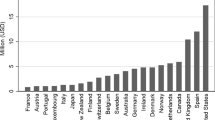Abstract
In recent years, the United States and other democracies have developed new programmes to support civil society in other countries. These programmes are often justified by real threats that independent non-governmental organizations, civic associations, and social movements face from authoritarian governments. However, little effort has gone into analysing whether external aid helps or harms local civil societies. This chapter explores and critiques American programmes that support threatened civil society abroad. In the light of current knowledge about how civil societies function and flourish, the chapter questions both the practical impact of these programmes and the justifications offered for them. It also tackles the important policy issue that remains: when governments threaten political and religious groups in other countries, what is the most helpful response that foreign governments can make?
Access this chapter
Tax calculation will be finalised at checkout
Purchases are for personal use only
Similar content being viewed by others
Bibliography
Bob, C. (2005). The marketing of rebellion: Insurgents, media, and international activism. Cambridge: Cambridge University Press.
Bob, C. (2011). Civil and uncivil society. In M. Edwards (Ed.), The Oxford handbook of civil society (pp. 209–219). New York: Oxford University Press.
Carothers, T., & Brechenmacher, S. (2014). Closing space: Democracy and human rights support under fire. Washington, DC: Carnegie Endowment for International Peace. Retrieved from http://carnegieendowment.org/files/closing_space.pdf
Economist. (2015). Foreign funding of NGOs: Donors: Keep out, May 2, 1. Retrieved from http://www.economist.com/node/21616969/print
Edwards, M. (2011). Introduction: Civil society and the geometry of human relations. In M. Edwards (Ed.), The Oxford handbook of civil society (pp. 3–14). Oxford: Oxford University Press.
Finke, R., & Iannaccone, L. R. (1993). Supply-side explanations for religious change. Annals of the American Academy of Political and Social Science, 527, 27–39.
Gershman, C. (2004). Democracy promotion: The relationship of political parties and civil society. Democratization, 11(3), 27–35.
Jenne, E., & Mudde, C. (2012). Can outsiders help? Journal of Democracy, 23(3), 147–155.
Kuperman, A. J. (2008). The moral hazard of humanitarian intervention: Lessons from the Balkans. International Studies Quarterly, 52(1), 49–80.
Lifeline: Embattled Civil Society Organizations Assistance Fund. (2015). Retrieved December 15, 2015, from http://www.state.gov/r/pa/prs/ps/2013/09/214567.htm
McAdam, D. (1999). Political process and the development of black insurgency, 1930–1970 (2nd ed.). Chicago: University of Chicago Press.
Meyer, C. A. (1995). Opportunism and NGOs: Entrepreneurship and Green North-South transfers. World Development, 23(8), 1277–1289.
Mitchell, L. A. (2013). Uncertain democracy: US foreign policy and Georgia’s Rose revolution. Philadelphia: University of Pennsylvania Press.
Pekkanen, R. (2003). Molding Japanese civil society: State-Structured incentives and the patterning of civil society. In F. J. Schwartz & S. Pharr (Eds.), The state of civil society in Japan (pp. 116–134). Cambridge: Cambridge University Press.
PEN America. (2015). Global chilling: The impact of mass surveillance on international writers. Retrieved from http://www.pen.org/sites/default/files/globalchilling_2015.pdf
Putnam, R. D. (1993). Making democracy work: Civic traditions in modern Italy. Princeton: Princeton University Press.
Ron, J., Ramos, H., & Rodgers, K. (2005). Transnational information politics: NGO Human rights reporting, 1986–2000. International Studies Quarterly, 49(3), 557–588.
Sarotte, M. E. (2014). The collapse: The accidental opening of the Berlin wall. New York: Basic Books.
Spoerri, M. (2014). Engineering revolution: The paradox of democracy promotion in Serbia. Philadelphia: University of Pennsylvania Press.
Stephan, M. J., Lakhani, S., & Naviwala, N. (2015). Aid to civil society: A movement mindset. Washington, DC: United States Institute of Peace. Retrieved from http://www.usip.org/sites/default/files/SR361_Aid_to_Civil_Society_A_Movement_Mindset.pdf
Thomas, D. C. (2001). The Helsinki effect: International norms, human rights, and the demise of communism. Princeton: Princeton University Press.
de Tocqueville, A. (2002 [1835, 1840]). Democracy in America. Chicago: University of Chicago Press.
US AID. (2014). Stand with civil society: Best practices. Retrieved from www.usaid.gov/sites/default/files/documents/1866/SWCS%20Best%20Practices%20Publications%20Final%20(1).pdf
Wedel, J. R. (2001). Collision and collusion: The strange case of Western aid to Eastern Europe. New York: Palgrave.
White House. (2013) Fact sheet: US support for civil society. Retrieved from https://www.whitehouse.gov/the-press-office/2013/09/23/fact-sheet-us-support-civil-society
White House. (2014) Deepening US government efforts to collaborate with and strengthen civil society. Retrieved from www.whitehouse.gov/the-press-office/2014/09/23/presidential-memorandum-civil-society
Author information
Authors and Affiliations
Editor information
Editors and Affiliations
Copyright information
© 2017 The Author(s)
About this chapter
Cite this chapter
Bob, C. (2017). Foreign Government Support for Threatened Civil Societies: Helpful or Harmful?. In: Marchetti, R. (eds) Partnerships in International Policy-Making. International Series on Public Policy . Palgrave Macmillan, London. https://doi.org/10.1057/978-1-349-94938-0_13
Download citation
DOI: https://doi.org/10.1057/978-1-349-94938-0_13
Published:
Publisher Name: Palgrave Macmillan, London
Print ISBN: 978-1-349-94937-3
Online ISBN: 978-1-349-94938-0
eBook Packages: Political Science and International StudiesPolitical Science and International Studies (R0)




